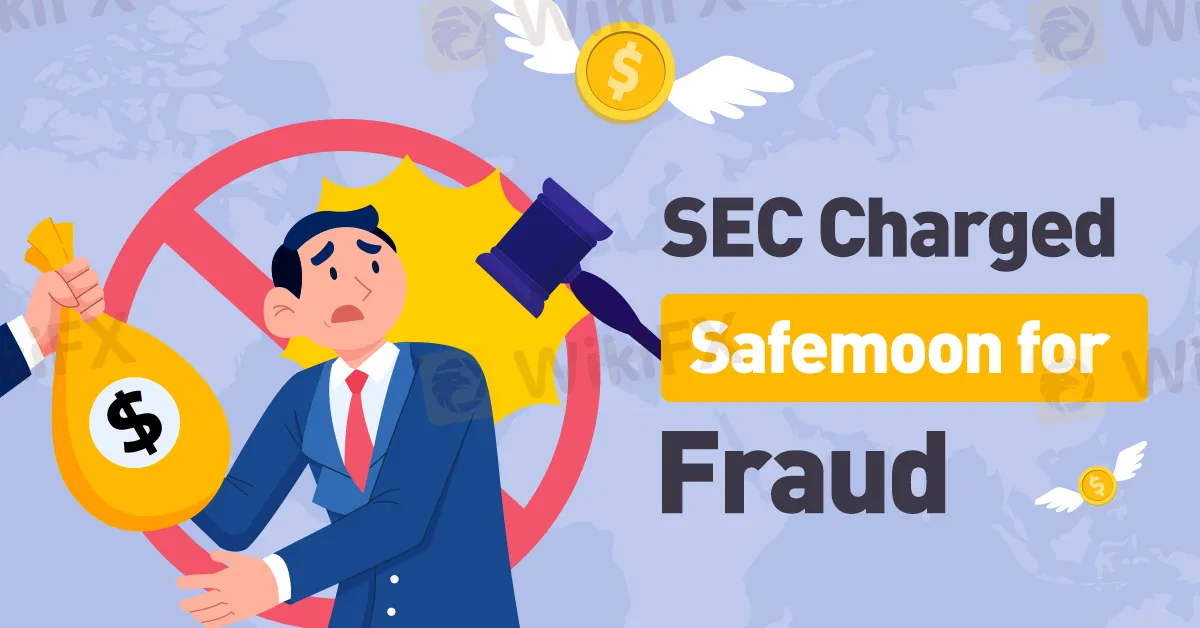简体中文
繁體中文
English
Pусский
日本語
ภาษาไทย
Tiếng Việt
Bahasa Indonesia
Español
हिन्दी
Filippiiniläinen
Français
Deutsch
Português
Türkçe
한국어
العربية
SEC Charged Safemoon for Fraud
Abstract:The U.S. Securities and Exchange Commission (SEC) has filed charges against SafeMoon and its executives for an alleged fraudulent scheme involving the unregistered sale of SafeMoon tokens (SFM), a cryptocurrency that attracted investors with promises of substantial returns, leading to legal action and arrests.

The U.S. Securities and Exchange Commission (SEC) has filed charges against SafeMoon, its Founder Kyle Nagy, SafeMoon US, and company executives John Karony and Thomas Smith. The charges revolve around an alleged fraudulent scheme related to the unregistered sale of SafeMoon tokens (SFM), a cryptocurrency that made enticing promises of significant returns.
The SEC's allegations suggest that the leadership of SafeMoon misled investors by assuring the security of their investments while a substantial portion of the liquidity pool remained unsecured. This purportedly led to the misappropriation of over $200 million for personal use.
The value of SFM saw a remarkable increase of more than 55,000 percent between March 12 and April 20, 2021, resulting in a market capitalization of $5.7 billion during that period. However, this rapid growth was short-lived, as the revelation of the unsecured liquidity pool triggered a nearly 50% price crash in April 2021.
In response to this price drop, Karony and Smith are alleged to have used misappropriated assets to artificially bolster SFM's price and manipulate the market. Additionally, Karony faces accusations of engaging in wash trading, a practice that can create a misleading impression of market activity.
David Hirsch, Chief of the SEC Enforcement Division's Crypto Assets and Cyber Unit, pointed out the vulnerabilities associated with unregistered offerings within the decentralized finance sector, where transparency and accountability are often lacking. These shortcomings can be exploited by individuals for personal gain.

The SEC has initiated legal proceedings in the U.S. District Court for the Eastern District of New York, charging the defendants with violations of the registration and anti-fraud provisions of the Securities Act of 1933, as well as the anti-fraud provisions of the Securities Exchange Act of 1934.
The founders and executives of SafeMoon are now facing federal charges, including conspiracy to commit securities fraud, wire fraud, and money laundering. Karony and Smith have been apprehended, with Karony in Provo, Utah, and Smith in Bethlehem, New Hampshire. However, Kyle Nagy remains at large, and law enforcement is actively seeking his apprehension. The U.S. Department of Justice has also filed additional lawsuits against the SafeMoon founders in a federal court located in Brooklyn.

Disclaimer:
The views in this article only represent the author's personal views, and do not constitute investment advice on this platform. This platform does not guarantee the accuracy, completeness and timeliness of the information in the article, and will not be liable for any loss caused by the use of or reliance on the information in the article.
Read more

Authorities Alert: MAS Impersonation Scam Hits Singapore
MAS scam alert: Scammers impersonate officials, causing $614K losses in Singapore since March 2025. Learn how to spot and avoid this impersonation scam.

Billboard Warns of Crypto Scams Using Its Name – Stay Alert!
Billboard warns against fake crypto scams using its brand. Learn how to spot fraud and protect yourself from fake promotions.

Rising WhatsApp Scams Highlight Need for Stronger User Protections
UK consumers lose £2,437 on average to WhatsApp scams. Revolut demands stricter verification and AI monitoring to combat rising fraud on Meta platforms.

How a Housewife Lost RM288,235 in a Facebook Investment Scam
A 47-year-old housewife in Malaysia recently fell victim to an online investment scam, losing a substantial sum of RM288,235 after engaging with a fraudulent scheme advertised on Facebook.
WikiFX Broker
Latest News
The Withdrawal Trap: How Scam Brokers Lure Victims into Paying More
FCA to Investors: Think Twice Before Trusting These Brokers
Trump\s tariffs: How could they affect the UK and your money
Trump gambles it all on global tariffs he\s wanted for decades
TradingView Brings Live Market Charts to Telegram Users with New Mini App
Trump tariffs: How will India navigate a world on the brink of a trade war?
Interactive Brokers Launches Forecast Contracts in Canada for Market Predictions
Authorities Alert: MAS Impersonation Scam Hits Singapore
Stocks fall again as Trump tariff jitters continue
IG Group Acquires Freetrade for £160M to Expand UK Investment Market
Currency Calculator







